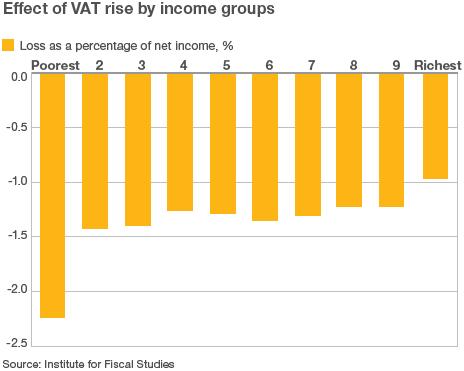VAT rate rises from 17.5% to 20%
- Published
How will the VAT rise affect the prices families pay at the till?
The standard rate of VAT has risen from 17.5% to 20% as the government looks to boost tax revenues to cut its deficit.
Business groups have warned that retailers will be hit by the increase, while opponents of the rise have said the poorest will be hit hardest.
The government says the rise is necessary to help bring down the UK's high budget deficit.
Chancellor George Osborne said the move was more "progressive" than a hike in income tax or National Insurance.
Food, children's clothing, newspapers and magazines are not subject to VAT.
'Wrong tax'
When unveiling the VAT rise over the summer, Chancellor George Osborne said it would raise more than £13bn a year by the end of the parliament.
However, the Labour opposition has accused the government of penalising low-income families.
Labour leader Ed Miliband said it was the "wrong tax at the wrong time", arguing that the rise would hit families at a time when they will be under pressure from government spending cuts.
And shadow chancellor Alan Johnson has warned the move is likely to hit the poor hardest.
But Mr Osborne told the BBC on Tuesday that targeting VAT was more "progressive" than increasing income tax or National Insurance.
Although they will end up paying less VAT in total, lower income households spend a bigger share of their incomes on taxed goods, meaning they are proportionately harder hit.

But BBC economics editor Stephanie Flanders points out that the impact of the VAT rise on poorer households needs to be understood within the wider context of government austerity.
"Looking beyond today's news, to the freeze in child benefit, the removal of family tax credit from many families, the real terms cut in the higher rate threshold, and all the rest... VAT going up to 20% is, quite literally, not the half of it," she says.
Concentrated burst
Meanwhile, retailers are left worried that they may face a big drop in sales starting this week.
Research by the Centre for Retail Research and online shopping group Kelkoo has suggested that retail sales will fall by about £2.2bn in the first three months of the year as a result of the rise in VAT.
The British Retail Consortium (BRC) has also warned that the rise, announced in the June budget, may have squeezed the traditional January sales period into a concentrated burst around the New Year.
More than seven out of 10 retailers polled by the BRC thought that their customers would bring forward purchases to beat the VAT increase.
"We are expecting to see a very quiet period over the next few months," said the BRC's Jane Bevis, warning that with transport costs, commodity prices, business rates and national insurance all rising, some businesses were feeling the pinch very hard.
The rise is particularly unwelcome for those sensitive to the cost of petrol, coming on top of rising oil prices and an increase in fuel duty.
However, others suggest that the impact on sales may be quite short-lived.
"The increase will inevitably affect the first quarter of this year, possibly the second quarter," said Adrian Houstoun, from the chartered accountancy firm Kingston Smith.
But he thinks that a 2% price rise is unlikely to have a lasting impact, and eventually people will revert to their old spending habits.
Bob Darke, commercial director at electrical retailer Comet, agrees: "There is no reason to believe that consumer spending can't continue at pretty similar levels that we saw in 2010."
Inflation headache
The VAT rise is also a worry for the Bank of England.
At 3.3%, the annual rise in the consumer prices index is already well above the Bank's target of 2%, and the increased VAT rate is likely to push inflation towards 4% this year, analysts say.
One member of the Bank's policy-setting committee, Andrew Sentance, has voted repeatedly for a rate rise in recent months, to head off the inflation risk.
But other members think the high inflation is due to a number of one-off events, not least the VAT rise, and will subside once government austerity measures kick in.
However, the VAT rise may spur a broader increase in the price of goods, according to a survey of 200 senior managers by accountancy group KPMG.
It has claimed that many retailers are planning to use the tax rise to "mask" more extensive price increases.
It said 60% of retailers and consumer product manufacturers planned to increase their prices over and above the VAT rise.
But some retailers, including Marks and Spencer and Debenhams, have said they will pass through the cost of the tax rise only gradually, although according to Mr Houstoun, this may just be because it is not feasible for them to raise all of their prices overnight.
The tax rise will also increase the advantage of big online vendors, who avoid charging VAT altogether on small items by shipping them through the Channel Islands.
"This is possibly the most damaging tax avoidance scheme in the last decade, as it has a direct impact of virtually every single UK retail business," complained the lobby group Retailers Against VAT Abuse Schemes.
- Published4 January 2011
- Published4 January 2011
- Published3 January 2011
- Published30 December 2010